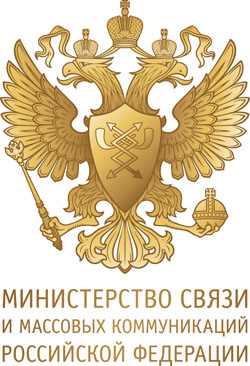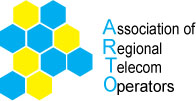|
|
 |
|
|
|
Supported by:
 |
The Ministry of Communications and Mass Media of the Russian Federation is a federal agency under the executive branch responsible for drafting and implementing national policy and legal regulation in:
- information technology, including the creation of government information resources and the promotion of access to such resources
- telecommunications, including the allocation of and conversion of the radio frequency spectrum, and postal communications mass communications and the media, including the electronic media, the development of the Internet, television and radio broadcasting, and related technology publishing and printing
- personal data processing.
The Ministry of Communications and Mass Media administers the national postal system, and national and international telecommunications networks.
The Ministry coordinates and controls activities of the Federal Service for Supervision of Telecom and Mass Communications, the Federal Agency for Information Technologies, the Federal Communications Agency, the Federal Agency for Press and Mass Communications.
Igor Shchogolev is the Head of the Ministry of Communications and Mass Media is of the Russian Federation.
|
 |
The Association of the National Radio Frequency Resource Users (NATIONAL RADIO ASSOCIATION) is a nonprofit organization founded in November 1997 under support of the State Commission for Radio Frequencies (GKRCH).
The National Radio Association is aimed at integration of efforts of telecommunications operators and manufacturers for resolution of the spectrum issues and implementation of new radio technology in the Russian Federation.
Basic areas of activities:
Participation in national technological policy-making on radio spectrum use;
Representation and protection of common interests of the Association members in federal legislative and executive bodies for telecommunications as well as international organizations involved in regulation and supervision of radio spectrum use;
Conducting research and development, experimental studies aimed to improvement of spectrum use in the interests of the NRA members;
Assistance in design, manufacture and operation of the modern radio technology systems, equipment and software.
|
 |
Association of Regional Telecom Operators (ARTO) is one of leading Russian associations of telecom market players and was founded in February 1995 (former name Association-800). ARTO is a non-commercial association of companies created for the purpose of coordination of business activities, representation and protection of general property interests of its members in the sphere of communications. Today the association unites 30 companies which are engaged in development and operation of mobile and fixed-line networks in RF and CIS countries. Primary goals of ARTO are assistance to regional operators in business and networks development, assistance in interaction with communications administration. ARTO effectively defends interests of regional operators, contributes to creation of liberal telecommunication environment and fair competition, pursues the policy of implementation of technical and economical integration of participants of communication development process on the territory of RF and CIS countries. ARTO cooperates closely with other specialized associations and alliances, participates in works on implementation of new technologies and services.
|
 |
GSA (Global mobile Suppliers Association) represents leading GSM/EDGE/WCDMA-HSPA/LTE suppliers, providing trusted, widely referenced reports, facts, analysis and information explaining market developments and trends. GSA advises governments, regulators and policy-makers on the optimum conditions for market development. Briefings are given to media and analysts. GSA-organized seminars facilitate enhanced dialog between operators, members and developer communities. GSA is a 3GPP Market Representation Partner and co-operates with other key organizations worldwide. The website www.gsacom.com is targeted to the industry and the main channel for distribution of information and news. The RSS feed is complemented by social networking services including the GSA LinkedIN Group.
|
 |
WiGig Alliance was established by technology leaders within the CE, PC, semiconductor and handheld industries to address the need for faster, wireless connectivity between computing, communications and entertainment devices. The organization has developed a unified specification that allows devices to communicate at multi-gigabit speeds never before experienced with wireless technology.
Our mission is to establish a global ecosystem of high-speed and easy-to-use wireless devices that work together seamlessly to connect people in the digital age. WiGig technology enables multi-gigabit wireless communications among consumer electronics, handheld devices and PCs, and drives industry convergence to a single radio using the readily available, unlicensed 60 GHz spectrum.
|
 |
MPEGIF is an independent and platform neutral not-for-profit organisation facilitating and furthering the widespread adoption and deployment of MPEG and related standards in next generation digital media services. It provides a forum to exchange information and views on technological, economic and regulatory issues that are relevant to these services. It also provides a powerful industry voice advocating the adoption of standards and consolidating the direction of the industry in the time of transition from analogue to digital television and media services. Its focus and constituency is derived from cable, satellite, telecommunication and new media service operators, channel owners, content providers, broadcasters, equipment manufacturers, system integrators, software providers, as well as industry advocacy groups, industry analysts, financial institutions and academic institutes
|
 |
Mobile broadband is changing the way the world communicates. The UMTS Forum helps all players in this dynamic new value chain understand and profit from the opportunities of 3G/UMTS and its Long Term Evolution (LTE).
The UMTS Forum contributes actively to the work of the ITU, ETSI, 3GPP and CEPT as well as other technical, commercial and regulatory organisations globally.
It supports the interests of its membership with a range of studies, reports and other outputs. Key focus areas include markets trends, mobile broadband services and applications, spectrum & regulation, technology & implementation. A strong promotional voice is maintained via a high-profile presence at conferences, seminars and workshops as well as regular briefings to the media, analysts and other stakeholders.
Membership of the UMTS Forum draws together everyone with an interest in mobile broadband, including network operators, regulators and the manufacturers of network infrastructure and terminal equipment |
|
|

Media Support:
|
|
|
 |
|
